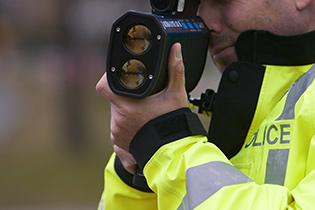What is a speeding fine?
If you are detected driving a vehicle above the legal speed limit by a speed camera or police officer, a penalty notice will be issued by the Roads and Maritime Services. The penalty notice will impose a fine, demerit points, and possibly licence suspension.
Excess speed can be detected in a number of ways, including from stationary radars such as speed cameras, mobile speed cameras, or through laser speed testing (LIDAR), which stands for Light Detection and Ranging.
Penalty notice
Unless you are pulled over by the police while driving, you will typically receive a penalty notice in the mail. The penalty notice will set out the fine owed and the demerit points incurred. Paying the fine means accepting that you were speeding. As speeding is not a criminal offence, it will not go on your criminal record.
If you believe that the penalty notice is incorrect, and that you were not speeding, you may choose to request a review of the fine or go to court and challenge the notice.
Penalties for speeding
Fines and demerit points
The amount of the fine and number of demerit points you receive will depend on:
- How fast you were driving.
- The type of motor vehicle you were driving.
- The kind of licence you held at the time.
The following table sets out the fines and demerit points for speeding while driving a “C class vehicle”. This covers most cars, vans, utes, and some light trucks.
A full unrestricted licence has a limit of 13 demerit points. Once you reach this limit, your licence will be suspended.
| Speeding offence | Fine | Demerit Points |
|---|---|---|
| Exceed speed up to 10km/h | $365 | 1 |
| Exceed speed over 10 km/h | $489 | 3 |
| Exceed speed over 20 km/h | $609 | 4 |
| Exceed speed over 30 km/h | $1,464 | 5 |
| Exceed speed over 45 km/h | $2,530 | 6 |
Court-imposed fines
If you challenge the penalty notice and your matter is heard before a court, the maximum fines that can be imposed increase significantly.
| Speeding offence | Light vehicles | Heavy vehicles |
|---|---|---|
| Exceed speed up to 10km/h | $2,200 | $2,200 |
| Exceed speed over 10 km/h | $2,200 | $2,200 |
| Exceed speed over 20 km/h | $2,200 | $2,200 |
| Exceed speed over 30 km/h | $2,200 | $2,200 |
| Exceed speed over 45 km/h | $2,530 | $3,740 |
Licence suspension and disqualification periods
If you were driving more than 30 kilometres per hour (km/h), your licence may also be suspended. If the matter proceeds to court, the court can disqualify your licence. You licence may be suspended or disqualified for:
- A period of three months if you were driving more than 30km/h above the speed limit.
- A period of six months if you were driving more than 45km/h above the speed limit.
Both a licence suspension and disqualification prohibit you from driving for the specified period. However, a licence suspension is imposed by the RMS or NSW Police without a formal conviction, whereas a licence disqualification is imposed by a court as part of the penalty for a formal conviction.
Learner and P1 licence holders will have their licence suspended for three months for any speeding offence.

